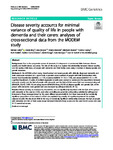Disease severity accounts for minimal variance of quality of life in people with dementia and their carers: analyses of cross-sectional data from the MODEM study
| dc.contributor.author | Farina, Nicolas | |
| dc.contributor.author | King, D | |
| dc.contributor.author | Burgon, C | |
| dc.contributor.author | Berwald, S | |
| dc.contributor.author | Bustard, E | |
| dc.contributor.author | Feeney, Y | |
| dc.contributor.author | Habibi, R | |
| dc.contributor.author | Comas-Herrera, A | |
| dc.contributor.author | Knapp, M | |
| dc.contributor.author | Banerjee, S | |
| dc.date.accessioned | 2021-09-20T12:48:08Z | |
| dc.date.issued | 2020-12 | |
| dc.identifier.issn | 1471-2318 | |
| dc.identifier.issn | 1471-2318 | |
| dc.identifier.other | 232 | |
| dc.identifier.uri | http://hdl.handle.net/10026.1/17866 | |
| dc.description.abstract |
<jats:title>Abstract</jats:title><jats:sec> <jats:title>Background</jats:title> <jats:p>Due to the progressive nature of dementia, it is important to understand links between disease severity and health-related outcomes. The aim of this study is to explore the relationship between disease severity and the quality of life (QoL) of people with dementia and their family carers using a number of disease-specific and generic measures.</jats:p> </jats:sec><jats:sec> <jats:title>Methods</jats:title> <jats:p>In the MODEM cohort study, three-hundred and seven people with clinically diagnosed dementia and their carers were recruited on a quota basis to provide equal numbers of people with mild (standardised Mini-Mental State Examination (sMMSE), <jats:italic>n</jats:italic> = 110), moderate (sMMSE 10–19, <jats:italic>n</jats:italic> = 100), and severe (sMMSE 0–9, <jats:italic>n</jats:italic> = 97) cognitive impairment. A series of multiple regression models were created to understand the associations between dementia severity and the QoL of people with dementia and the QoL of their carers. QoL was measured using self- (DEMQOL, EQ-5D, CASP-19) and proxy-reports (DEMQOL-Proxy, EQ-5D) of disease-specific and generic QoL of the person with dementia. Carer generic QoL was measured by self-report (EQ-5D, SF-12).</jats:p> </jats:sec><jats:sec> <jats:title>Results</jats:title> <jats:p>Disease severity, as measured by the sMMSE, was not significantly associated with the QoL of the person with dementia or the carer (<jats:italic>p</jats:italic> > 0.05), even after controlling for potential confounding variables for self-reported instruments. Proxy measures (rated by the carer) differed systematically in that there were small, but statistically significant proportions of the variance of QoL was explained by severity of cognitive impairment in multiple adjusted models. We also found little in the way of statistically significant relationships between the QoL of people with dementia and that of their carers except between DEMQOL-Proxy scores and the carer EQ-5D scores and carer SF-12 mental sub-scores.</jats:p> </jats:sec><jats:sec> <jats:title>Conclusions</jats:title> <jats:p>The data generated supports the somewhat counterintuitive argument that severity of cognitive impairment (and therefore severity of dementia) is not associated with lower QoL for the person with dementia when self-report measures are used. However, in absolute terms, as judged by the variance in the multivariate models, it is clear that the contribution of dementia severity to the QoL of people with dementia is minimal whatever the measurement used, be it self- or proxy-rated, or disease-specific or generic.</jats:p> </jats:sec> | |
| dc.format.extent | 0-0 | |
| dc.format.medium | Electronic | |
| dc.language | en | |
| dc.language.iso | en | |
| dc.publisher | Springer Science and Business Media LLC | |
| dc.subject | Quality of life | |
| dc.subject | Dementia | |
| dc.subject | Alzheimer's disease | |
| dc.subject | Wellbeing | |
| dc.subject | Health | |
| dc.subject | Cognitive impairment | |
| dc.subject | Caregiver | |
| dc.title | Disease severity accounts for minimal variance of quality of life in people with dementia and their carers: analyses of cross-sectional data from the MODEM study | |
| dc.type | journal-article | |
| dc.type | Journal Article | |
| dc.type | Research Support, Non-U.S. Gov't | |
| plymouth.author-url | https://www.webofscience.com/api/gateway?GWVersion=2&SrcApp=PARTNER_APP&SrcAuth=LinksAMR&KeyUT=WOS:000549976000003&DestLinkType=FullRecord&DestApp=ALL_WOS&UsrCustomerID=11bb513d99f797142bcfeffcc58ea008 | |
| plymouth.issue | 1 | |
| plymouth.volume | 20 | |
| plymouth.publication-status | Published | |
| plymouth.journal | BMC Geriatrics | |
| dc.identifier.doi | 10.1186/s12877-020-01629-1 | |
| plymouth.organisational-group | /Plymouth | |
| plymouth.organisational-group | /Plymouth/Faculty of Health | |
| plymouth.organisational-group | /Plymouth/Faculty of Health/Peninsula Medical School | |
| plymouth.organisational-group | /Plymouth/Faculty of Health/Peninsula Medical School/PMS - Manual | |
| plymouth.organisational-group | /Plymouth/REF 2021 Researchers by UoA | |
| plymouth.organisational-group | /Plymouth/REF 2021 Researchers by UoA/UoA03 Allied Health Professions, Dentistry, Nursing and Pharmacy | |
| plymouth.organisational-group | /Plymouth/Users by role | |
| plymouth.organisational-group | /Plymouth/Users by role/Academics | |
| plymouth.organisational-group | /Plymouth/Users by role/Researchers in ResearchFish submission | |
| dc.publisher.place | England | |
| dcterms.dateAccepted | 2020-06-24 | |
| dc.rights.embargodate | 2021-9-21 | |
| dc.identifier.eissn | 1471-2318 | |
| dc.rights.embargoperiod | Not known | |
| rioxxterms.funder | Economic and Social Research Council | |
| rioxxterms.identifier.project | Comprehensive approach to modelling outcome and cost impacts of interventions for dementia | |
| rioxxterms.versionofrecord | 10.1186/s12877-020-01629-1 | |
| rioxxterms.licenseref.uri | http://www.rioxx.net/licenses/all-rights-reserved | |
| rioxxterms.licenseref.startdate | 2020-12 | |
| rioxxterms.type | Journal Article/Review | |
| plymouth.funder | Comprehensive approach to modelling outcome and cost impacts of interventions for dementia::Economic and Social Research Council |


